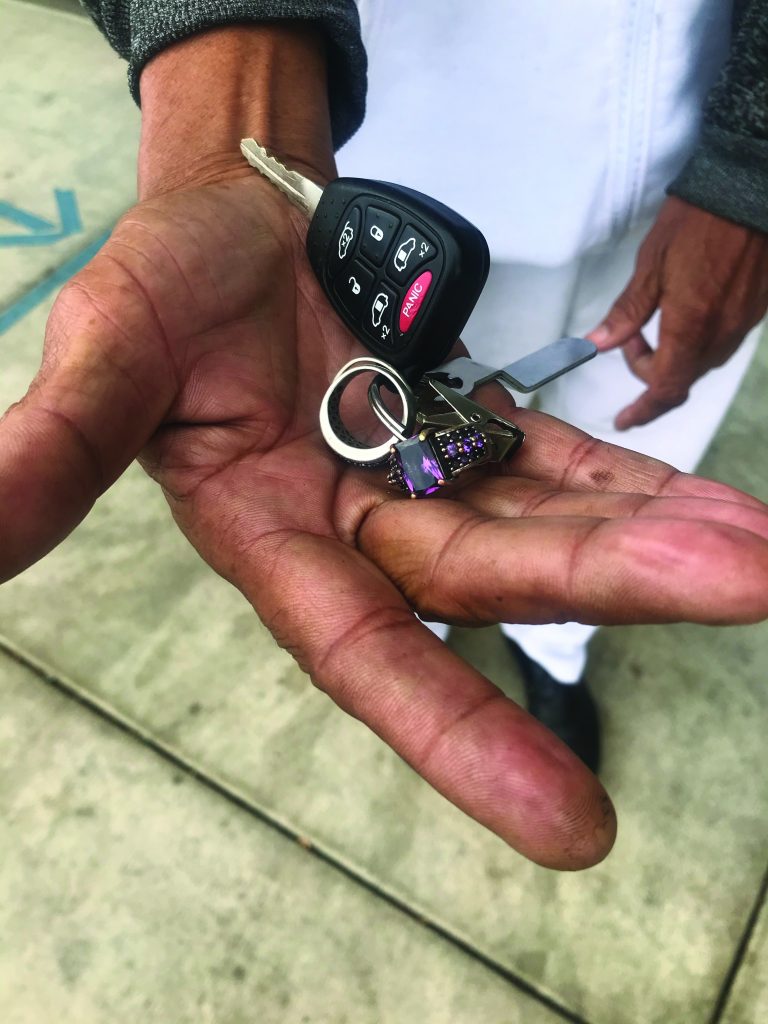
To hear Wilford Tyrone Jones tell it, Alton, Illinois was a magical place to grow up. Overlooking downtown is a statue of Robert Wadlow, a hometown hero who grew to become the tallest man in the world. Then there were legends of the Piasa Bird, a dragon that lived in the caves cut into the cliffs over the banks of the Mississippi River. Plus the Blue Pool, a flooded mining shaft that Jones heard was bottomless.

“It would suck you in if you got too close,” Jones, who’s 63 and goes by Tyrone, explained with a smile during a recent conversation with Street Spirit.
These days, you might bump into Jones selling papers by the corner of Shattuck Avenue and Vine Street. But Berkeley feels like a far cry from Jones’s childhood in a small community north of St. Louis, Missouri.
“We were adventurous in my hometown,” Jones said. “We grew up with the woods and wildlife.”
As a kid, Jones’s mother traveled a lot, so his grandmother Melissa White raised him and his seven siblings.
“She was a Cherokee Indian and we called her nanny,” Jones explained.
He describes his grandmother as an angel who always knew how to make their family feel good.
“We didn’t have a lot but we thought we grew up rich, because we lived rich,” Jones said. “I don’t know how she did it.”
Alton was a tight-knit community where all the adults took care of each other’s kids.
“If Ms. Rebecca caught you over there shooting dice on the curb, momma didn’t have to see you,” Jones said.
“Everyone in the town is your momma, everyone can whoop you.”
When Jones was 14 years old, he moved with his mother to San Bernardino, CA, east of Los Angeles. As luck would have it, someone left a set of conga drums in his new house.
“I started beating on them all the time,” he said.
Before long, Jones had grown into a talented percussionist. He was just a teenager but a group of older musicians welcomed him into their band called Revolution of Change.
“They would ask my mom if I could come with them to shows on the weekend,” Jones said.
The group played across Los Angeles, from nightclubs to high school auditoriums.
Jones remembered one gig in Hollywood where the group rocked the house with a rendition of “I’ll Take You There” by The Staple Singers.
“I played so hard my fingers were bleeding,” he said. By the time the show was over, “there was blood all over the congas.”

When he was 19, Jones moved with his family back to Alton, Illinois, where he met a young woman named Cathrine Harris. A year later, the pair had a son who they named Najai. Then shortly later, a daughter named Toya.
Jones was happy to be a father. But in his early 20s, Jones decided to move back to California with his mother. Cathrine and the kids stayed in Alton. From there on, Jones entered into a travelling phase that would last decades, moving from place to place, never putting down roots for too long.
“I kind of drifted,” he said. He inherited that wandering spirit from his mom. “She taught us to go to different places and try to live, don’t stay in one spot, go branch out.”
He popped around the country, living at different times in San Bernardino, California, Indianapolis, Indiana, and Racine, Wisconsin. Sometimes he’d stay years, other times just months.
Although Jones has lived out of his car, stayed in shelters, and participated in housing programs at many points in his life, he can’t really point to a moment where he became homeless, and he’s still not sure the label really feels right for him. “When I was younger, I never considered being homeless. I just considered me out here drifting and enjoying life,” he said. “It’s just that when you get older it turns homeless.”
Plus, he feels like he’ll never be homeless back in his hometown, Alton, because he knows plenty of people he could stay with while getting back on his feet. So going without a permanent roof over his head feels more like part of how things naturally go when he’s travelling around without a lot of money.
In his late 30s, Jones landed in Springfield, Illinois, for four years. There he met Rhonda Campbell. The two got together and they had three daughters, named Shonda, Kayla, and Ebony.
‘When I was younger… I just considered me out here drifting and enjoying life. When you get older it turns homeless’
For a few years, the young family travelled. Jones had become a maintenance man, painter, and landscaper. So when they arrived in a new place, they would usually check into a motel, and Jones would go out and rustle up some clients. They lived together in Los Angeles for a while, then later moved to Oakland. But when Jones was in his early 40s, the couple broke up and went their separate ways, although Jones stayed in touch with Rhonda and the kids.
Jones was still living in the Bay Area about 12 years ago when he first discovered Street Spirit. At the time, he was staying in a homeless shelter and saw other people selling the papers, so he decided to give it a shot. By his account, he quickly became one of the best salespeople for the paper at the time.
Jones left Oakland to move to Omaha, Nebraska. That’s where he first laid his eyes on Melody Biggs. Melody was sitting at a bus stop and she smiled at Jones as he walked by. Jones says there was an instant attraction between the two of them, so he just had to stop and ask for her number. Two months later, they got hitched.
“I thought I’d never get married,” he said. “But I guess God showed me that I could, he was just waiting until I got 49 years old.”
For over a decade, the couple travelled together, living in Omaha, St. Louis, and San Antonio, before coming out to the Bay Area last year.
“I enjoyed every moment with her, even the bad ones,” Jones said.
But shortly after the couple arrived in California, Biggs’s chronic kidney problems got worse. In October of 2019, she was admitted to Alta Bates Summit Medical Center in Berkeley. She died two weeks later.
Jones said that his experience at the hospital was terrible. His wife was receiving dialysis, and he’s worried that missteps in her treatment, and a failure to run additional tests as her condition worsened, could have contributed to her death. He also feels like the staff should have told them that she was at risk of passing away, because it came as a total surprise.
“If I knew my wife was going to die, I would have just stayed there all day and spent all that time with her,” he said. Instead, he was spending his days trying to find them housing so they could have a place to stay when she was released.
Jones was in the room when Melody died. He said that when he told staff she passed away, they made him leave and a security guard escorted him away. Over a year later, Jones still isn’t clear exactly what caused her death, and he said the hospital has been avoiding his questions.
“Won’t nobody get with me to explain why my wife’s heart stopped,” he said.
Jones wants to file a formal complaint, but says he hasn’t been able to because he doesn’t have the expertise to go up against the hospital and can’t afford to hire a lawyer.
“Our commitment to patient privacy, as well as legal requirements, prevent us from providing additional information” a Sutter Health spokesperson told Street Spirit in an email.
It’s been a struggle since his wife passed. “I know I got to keep going on but when you lose somebody like that, that you so close with, like that, man, it just, it just pulls all your energy out,” he said.

“I don’t think I’ll ever love like that again, she made my whole world,” Jones reflected. “I didn’t care what troubles I got in, how homeless we were doing. We didn’t care, we had one another.”
After she died, Jones felt like he had to leave Berkeley because everywhere he turned, it reminded him of the time the two had spent together.
He went to Sacramento. When COVID-19 hit, he was able to participate in a city program that provided homeless people with motel rooms. He stayed there for 6 months. When the program expired at the end of November, he got in the car and moved back to the Berkeley area looking for a new place to stay.
When Street Spirit caught up with him in December, he had just spent his first night in a shared housing program called the Hayward Housing Navigation Center. He was able to get into the program soon after arriving back in town because he’d first connected with the program coordinator months ago, before he travelled north to Sacramento.
Through the program, Jones is tasked with finding housing on the rental market. After he finds an apartment, the Navigation Center helps pay for it. Having support from the Navigation Center makes Jones a solid housing candidate, as his rent is insured by the program. However, finding housing on the rental market is not easy. Recently, after finding what was supposed to be a private bedroom and securing the funding to pay for it, Jones says the landlord switched things up on him last minute, trying to convince him to share the room for the same cost he had agreed to pay for a single. Feeling frustrated and taken advantage of, Jones decided to continue looking for housing elsewhere. He is currently looking for housing again, and living in his car in the meantime.
As for work, Jones plans to continue selling Street Spirit and also pick up some landscaping clients.
“If your yard looks ugly, I could, on a budget, make it look like a three, or four, or even five-thousand-dollar yard when I get done with it,” he said. His specialties include designing gardens with flowers and bricks. He is also a licensed painter who can work on both the interiors and exteriors of houses.
Jones wants to save up some money to get a place of his own, but he’s not sure he wants to settle down in the Bay Area. The whole reason he came here after more than a decade away was to show his wife the area.
“She ain’t here, and it ain’t fun no more,” he said. “My whole purpose for coming out here is gone.”
Jones thinks he might be happier moving to Atlanta, where his daughter Shonda lives. One of his brothers also lives in Atlanta, and his daughter Kayla lives up the road in Kentucky. Another option could be Indianapolis, where his daughter Ebony is raising five of his nine grandkids. His four other grandkids live in his hometown, Alton, Illinois.
“I’m ready to be a grandfather now,” he said. “To settle and be around my kids and start loving my grown daughters.”
No matter what comes next, Jones hopes it can help him process the deep loss he experienced last year. Because right now, that’s the main thing on his mind.
“I’ve got to get past grieving my wife,” he said. “And that’s going to take time.”
Street Spirits is a feature in which someone who lives on the street tells us their story.
Noah Baustin is a freelance journalist and audio producer based in Berkeley. He is also a student at UC Berkeley’s Graduate School of Journalism where he is studying investigative reporting and audio production.
